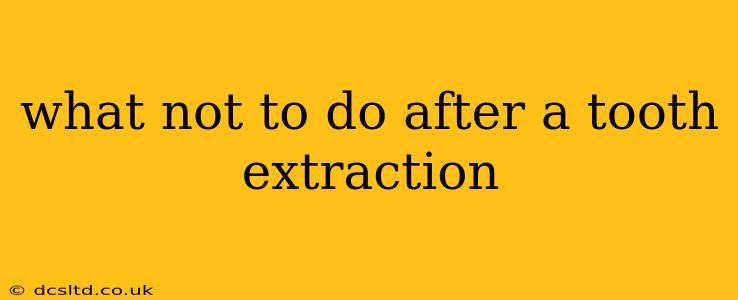Losing a tooth, whether through extraction or other means, is a significant event for your oral health. Proper post-extraction care is crucial for preventing complications and ensuring a smooth recovery. This guide outlines the critical things not to do after a tooth extraction to promote healing and minimize discomfort.
What Not to Do Immediately After Tooth Extraction
The first few hours after your extraction are critical. Neglecting proper care during this time significantly increases the risk of complications.
Don't Rinse Vigorously or Spit:
This is perhaps the most important piece of advice. Vigorous rinsing or spitting can dislodge the blood clot that forms in the extraction site (the socket). This clot is essential for healing and preventing a painful, dry socket. Gentle rinsing with saltwater is permitted, but avoid forceful actions.
Don't Touch or Probe the Extraction Site:
Resist the urge to touch or poke the extraction site with your tongue or fingers. This can disrupt the healing process and increase the risk of infection.
Don't Smoke:
Smoking significantly impairs healing after any surgery, including tooth extractions. The suction created by smoking can dislodge the blood clot and increase the risk of dry socket and infection. Avoid smoking for at least 72 hours, preferably longer.
Don't Use a Straw:
Similar to smoking, using a straw creates suction that can dislodge the crucial blood clot. Avoid using straws for at least a week to ensure proper healing.
Don't Eat or Drink Anything Hot:
Hot liquids and foods can irritate the extraction site and increase bleeding. Stick to cool or lukewarm beverages and soft foods initially.
What Not to Do in the Days Following Tooth Extraction
The healing process continues for several days. Continued cautious care will ensure a successful recovery.
Don't Engage in Strenuous Activity:
Avoid strenuous physical activity in the first few days. This includes intense workouts, heavy lifting, and anything that increases your blood pressure. Increased blood pressure can lead to increased bleeding at the extraction site.
Don't Neglect Your Medications:
Follow your dentist's instructions regarding pain medication and antibiotics (if prescribed). Taking medication as directed is crucial for managing pain and preventing infection.
Don't Ignore Signs of Infection:
Be vigilant for signs of infection, such as increased pain, swelling, fever, or pus. Contact your dentist immediately if you experience any of these symptoms.
Don't Eat Hard or Crunchy Foods:
Avoid hard, crunchy, or chewy foods that could irritate the extraction site or dislodge the blood clot. Stick to soft foods like yogurt, mashed potatoes, applesauce, and soup for several days.
What Not to Do Long-Term After Tooth Extraction
Even after the immediate post-operative period, there are things to avoid for optimal long-term oral health.
Don't Neglect Oral Hygiene:
Maintain a consistent oral hygiene routine, brushing and flossing gently around the extraction site once the initial healing period is over. However, avoid directly brushing the extraction site itself for several days.
Don't Skip Follow-Up Appointments:
Attend all scheduled follow-up appointments with your dentist to monitor the healing process and address any concerns.
What Happens if I Don't Follow These Instructions?
Failing to follow these instructions after a tooth extraction can lead to several complications, including:
- Dry Socket: A painful condition where the blood clot is dislodged, exposing the bone and nerve endings.
- Infection: Bacteria can enter the extraction site, causing pain, swelling, and potentially more serious complications.
- Prolonged Healing: Improper care can significantly prolong the healing process.
- Increased Pain and Discomfort: Following instructions minimizes pain and discomfort during recovery.
Following your dentist's instructions and adhering to these guidelines will significantly improve your chances of a quick and complication-free recovery after a tooth extraction. Remember, your dentist is your best resource for specific advice tailored to your individual situation.
